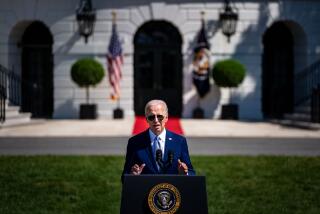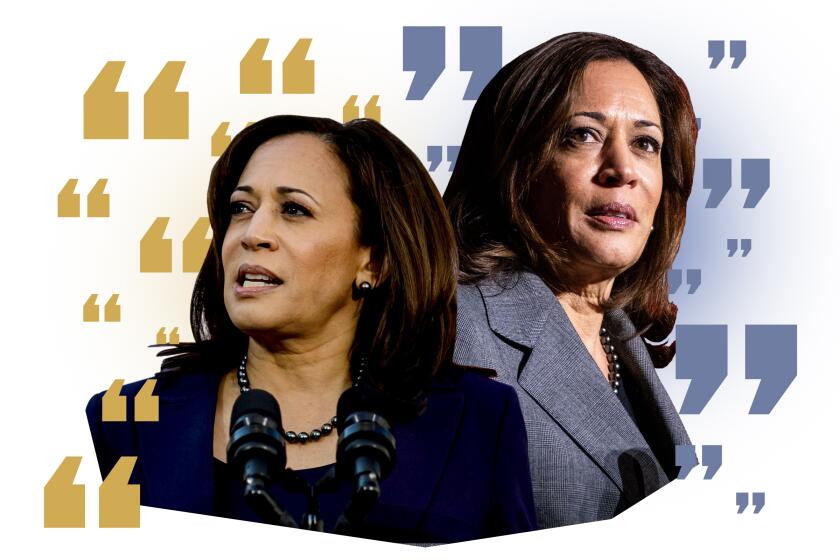GOP Offers Own Approach to Getting Tough on Tobacco
WASHINGTON â A visibly exhausted Senate Commerce Committee Chairman John McCain (R-Ariz.) unveiled a stringent tobacco bill Monday that would take a long step toward proving that Republicans can be tough on tobacco.
The measure would give the tobacco industry almost none of the protections it has sought from lawsuits and would raise the price of a pack of cigarettes by $1.10 over the next five years, an amount that industry negotiators say they have no choice but to oppose.
A last-minute decision to remove most of the billâs legal protections for tobacco companies makes it likely that McCain will get some Democrats as well as Republicans on his committee to vote for the legislation.
But the bill, denounced by the industry as âfundamentally flawedâ and financially âruinous,â faces an uncertain future on the Senate floor. Democrats already have pledged to strengthen its regulatory and tax provisions, which in turn could weaken support for the bill among many Republicans.
*
In the House, no bipartisan measure has yet emerged, and there is division within Republican ranks about what approach to take.
McCain was involved personally in the nearly round-the-clock negotiations on the bill during the last two weeks. âMy job was to craft this in a bipartisan fashion. . . . I canât and wonât be subject to a veto by the tobacco industry,â he said in discussing the measure Monday.
He said he had reached the decision to jettison the liability protections for the industry after consulting with committee Democrats.
However, the Democrats, including Sens. Ron Wyden (D-Ore.) and John F. Kerry (D-Mass.) said that, although they applauded McCainâs efforts, they would seek to make changes when the panel officially takes up the bill Wednesday.
âItâs a good start,â said Wyden.
White House Chief of Staff Erskine Bowles was similarly circumspect, praising some of the measureâs provisions but saying that others need to be strengthened.
Public health advocates also said they could not back the legislation as written.
âIts programs to reduce the number of children who smoke are too weak,â said C. Everett Koop, a former surgeon general who is viewed as one of the key public health experts on tobacco.
Congress is involved in a massive effort to rewrite regulation of the tobacco industry as a result of a proposed settlement reached last June between industry lawyers and attorneys general representing 40 states. The state officials had filed suit against the industry for reimbursement of the cost of caring for people with smoking-related diseases.
Under the proposed agreement, the industry said it would pay $368.5 billion--to be divided among the states and federal government--and to voluntarily stop almost all advertising in exchange for protections from all class-action lawsuits and punitive damages for past actions.
*
Legislation is needed to put into effect many aspects of the agreement, including the settlement of the statesâ lawsuits and the legal protections.
McCainâs proposal would allow class-action lawsuits. Also, its liability provisions, which were ironed out just 90 minutes before he unveiled them, would cap the legal damage the industry would have to pay at $6.5 billion a year. However, the industry would pay that amount into a fund regardless of whether there were judgments in lawsuits against it.
Although the industry--which has become a pariah on Capitol Hill because of its apparent targeting of children--was excluded by McCain from his committeeâs negotiations, it still has considerable leverage, and its condemnation of the bill in its current form cannot be taken lightly.
The industryâs cooperation is vital because the 1st Amendment protection of free speech prevents Congress from enacting the virtual ban on tobacco advertising that many legislators believe is necessary to discourage young people from viewing smoking as glamorous. Thus, the industry must agree to advertising limits on a voluntary basis.
With McCainâs legislation, the industry is threatening to disavow its previous commitments.
âThe industry agreed to these provisions only because they were part of a balanced compromise achieved in last Juneâs proposed resolution,â said J. Phil Carleton, a lawyer for the industry. âThis balance does not exist in the committeeâs plan and therefore the industry cannot and will not give its assent to it.â
Mississippi Atty. Gen. Mike Moore, who led the effort by the attorneys general to bring the companies to the table, was uncharacteristically sober at McCainâs news conference, clearly worried about the industry response and the possibility that the settlement could unravel.
âThe industry is probably close to walking away,â Moore said.
The bill that McCain plans to push through his committee has a far stronger regulatory thrust than Republicans have supported in the past for any industry.
Under it, the federal Food and Drug Administration would have authority to regulate tobacco, including tobacco advertising, and the agency would draft rules for retailers to follow to prevent cigarette sales to minors.
More to Read
Get the L.A. Times Politics newsletter
Deeply reported insights into legislation, politics and policy from Sacramento, Washington and beyond. In your inbox three times per week.
You may occasionally receive promotional content from the Los Angeles Times.









